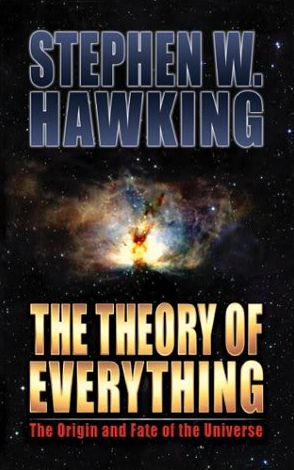My Rating - 4 out of 5 stars
Published by - Jaico
Genre - Physics/Non-Fiction
Publishing year - 2002
Language - English
ISBN - 978-8179925911
Pages - 132
Buy now - Amazon IN
My review -
The Theory of Everything by Stephen Hawking is a series of seven lectures. This book presents the most complex theories about black holes, expanding the universe, the origin of everything, the direction of time, and the big bang.
He briefly describes the universe's ideas from Aristotle, Newton, Einstein, Augustine, Hubble, Friedman, Galileo, and many more scientists and philosophers. For example, in 1928, an Indian, Subrahmanyan Chandrasekhar, calculated that a cold star of more than about one and a half times the sun's mass would not be able to support itself against its own gravity. This mass is now known as the Chandrasekhar limit.
Why don't we notice all the extra dimensions if they are really there? Why do we see only three spaces and only one facet? The suggestions are that the other dimensions are curved up into a space of tiny size, something like a million million million million millionth of an inch. This is so small that we just don't notice it.
The construction of a comprehensive, unified theory of everything is tough. So we have made progress by finding partial theories. For example, the universe would have started in a smooth and ordered state. But as time went on, it became lumpy and disordered. It appears that the universe evolves according to well-defined laws. We don't know if that may be ordained by God, but it seems that we can discover and understand these laws.
According to the author, the laws of physics do not distinguish between the past and the future. In other words, life would be just the same for the inhabitants of another planet who were our mirror images and who were made of antimatter.
"The sole remaining task for philosophy is the analysis of language." - Wittgenstein.
This book is a boon for physics lovers. The author didn't include complicated mathematical equations. He kept the language simple and easily understandable. The author mixes science with philosophy. It exhibits a subtle sense of humor in the book. It's a short read. Stephen Hawking poses interesting questions about God. All in all, a recommended reading.
Published by - Jaico
Genre - Physics/Non-Fiction
Publishing year - 2002
Language - English
ISBN - 978-8179925911
Pages - 132
Buy now - Amazon IN
My review -
The Theory of Everything by Stephen Hawking is a series of seven lectures. This book presents the most complex theories about black holes, expanding the universe, the origin of everything, the direction of time, and the big bang.
He briefly describes the universe's ideas from Aristotle, Newton, Einstein, Augustine, Hubble, Friedman, Galileo, and many more scientists and philosophers. For example, in 1928, an Indian, Subrahmanyan Chandrasekhar, calculated that a cold star of more than about one and a half times the sun's mass would not be able to support itself against its own gravity. This mass is now known as the Chandrasekhar limit.
Why don't we notice all the extra dimensions if they are really there? Why do we see only three spaces and only one facet? The suggestions are that the other dimensions are curved up into a space of tiny size, something like a million million million million millionth of an inch. This is so small that we just don't notice it.
The construction of a comprehensive, unified theory of everything is tough. So we have made progress by finding partial theories. For example, the universe would have started in a smooth and ordered state. But as time went on, it became lumpy and disordered. It appears that the universe evolves according to well-defined laws. We don't know if that may be ordained by God, but it seems that we can discover and understand these laws.
According to the author, the laws of physics do not distinguish between the past and the future. In other words, life would be just the same for the inhabitants of another planet who were our mirror images and who were made of antimatter.
"The sole remaining task for philosophy is the analysis of language." - Wittgenstein.
This book is a boon for physics lovers. The author didn't include complicated mathematical equations. He kept the language simple and easily understandable. The author mixes science with philosophy. It exhibits a subtle sense of humor in the book. It's a short read. Stephen Hawking poses interesting questions about God. All in all, a recommended reading.

No comments:
Post a Comment